九年级英语第一单元知识点归纳
2024九年级英语上册Unit1必背知识点

2024九年级英语上册Unit1 How can webecome goodlearners?必背知识点针对2024年九年级英语上册Unit 1 "How can we become good learners?"的必背知识点,可以归纳如下:一、重点词汇textbook /ˈtekstbuk/ n. 教科书;课本conversation /ˌkɔnvəˈseɪʃn/ n. 交谈;谈话aloud /əˈlaud/ adv. 大声地;出声地pronunciation /prəˌnʌnsiˈeiʃn/ n. 发音;读音sentence /ˈsentəns/ n. 句子patient /ˈpeiʃnt/ adj. 有耐性的n. 病人expression /ikˈspreʃn/ n. 表达(方式);表示discover /diˈskʌvə(r)/ v. 发觉;发现secret /ˈsi:krət/ n. 隐私;adj. 隐私的grammar /ˈgræmə(r)/ n. 语法repeat /riˈpi:t/ v. 重复;重做note /nəut/ n. 笔记;记录v. 留意;指出memorize /ˈmeməraiz/ v. 记忆;记住increase /Inˈkri:s/ v. 增加;增长speed /spi:d/ n. 速度v. 加速partner /ˈpa:(r)tnə(r)/ n. 搭档;同伴born /bɔ:(r)n/ v. 诞生adj. 天生的ability /əˈbiləti/ n. 能力;才能create /kriˈeit/ v. 创建;创造active /ˈæktiv/ adj. 活跃的;主动的attention /əˈtenʃn/ n. 注意;关注二、重点短语及句型1. have conversation(s) with sb. 同某人谈话例句:I often have conversations with my classmates about study.2. too…to…太……而不能例句:She is too young to go to school.3. the secret to………的秘诀例句:The secret to success is hard work.4. be afraid of doing sth. = be afraid to do sth. 害怕做某事例句:I'm afraid to speak in front of many people.5. look up 查阅(文献,词典等);向上看例句:Please look up this word in the dictionary.6. repeat out loud 大声跟读例句:He repeats the sentence out loud to improve his pronunciation.7. make mistakes in 在……方面犯错误例句:I often make mistakes in grammar.8. connect…with…把……和……连接/联系起来例句:We should connect our study with real life.9. get bored/be bored 感到厌烦例句:I get bored easily when studying math.10. be stressed out 焦虑不安的例句:I feel stressed out before exams.11. pay attention to 注意;关注例句:Please pay attention to your spelling.12. depend on/rely on 取决于;依靠例句:My success depends on my hard work.13. the ability to do sth. 做某事的能力例句:She has the ability to learn new skills quickly.三、重点语法1. by + doing 通过……方式例句:We can improve our English by speaking more.2. 总结提建议的句子What/how about + doing sth.?Why don't you + V原sth.?Why not + V原sth.?Let's + V原sth.Shall we/I + V原sth.?3. also, either, too 的用法also 用于肯定句,常在句子中间。
英语九年级unit1知识点
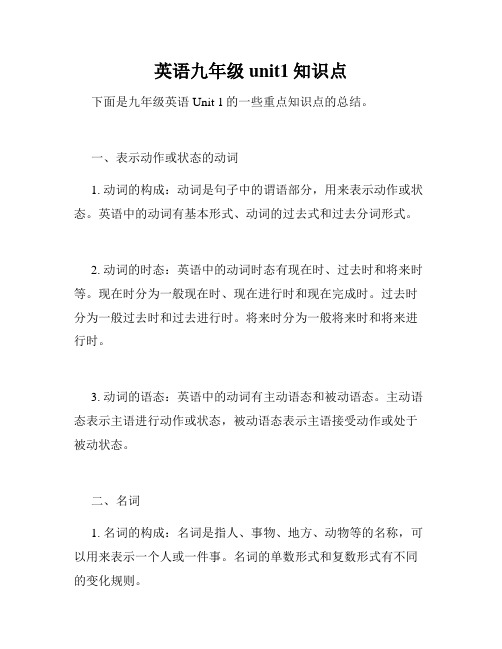
英语九年级unit1知识点下面是九年级英语Unit 1的一些重点知识点的总结。
一、表示动作或状态的动词1. 动词的构成:动词是句子中的谓语部分,用来表示动作或状态。
英语中的动词有基本形式、动词的过去式和过去分词形式。
2. 动词的时态:英语中的动词时态有现在时、过去时和将来时等。
现在时分为一般现在时、现在进行时和现在完成时。
过去时分为一般过去时和过去进行时。
将来时分为一般将来时和将来进行时。
3. 动词的语态:英语中的动词有主动语态和被动语态。
主动语态表示主语进行动作或状态,被动语态表示主语接受动作或处于被动状态。
二、名词1. 名词的构成:名词是指人、事物、地方、动物等的名称,可以用来表示一个人或一件事。
名词的单数形式和复数形式有不同的变化规则。
2. 可数名词和不可数名词:可数名词可以用数词或冠词来修饰;不可数名词通常不能与数词连用,只能用量词来表示。
三、形容词和副词1. 形容词的构成:形容词是用来表示事物性质或状态的词汇,可以修饰名词或代词。
2. 副词的构成:副词是用来修饰动词、形容词或其他副词的词汇,用来表达程度、方式或时间。
大部分副词是通过在形容词后面加上-ly构成。
四、代词1. 人称代词:人称代词分为主格和宾格两种形式。
主格代词作主语,宾格代词作宾语。
2. 物主代词:物主代词用来表示所属关系,包括形容词性物主代词和名词性物主代词。
3. 反身代词:反身代词用作宾语,表示某人自己做某事。
五、冠词和介词1. 冠词的用法:冠词分为定冠词和不定冠词,用来限定名词。
定冠词有the,不定冠词有a和an。
2. 介词的用法:介词用来表示名词或代词与其他单词之间的关系,常用于表示时间、地点、方向、目的等。
六、连接词和从句1. 连接词的分类:连接词分为并列连词、关系连词和从属连词。
并列连词用来连接两个相同的成分,关系连词用来引导定语从句,从属连词用来引导时间、条件、原因、目的、方式、结果等从句。
2. 从句的种类:从句分为名词性从句、定语从句和状语从句。
九年级英语上册各单元知识点归纳

九年级英语上册各单元知识点归纳第一单元:基础知识1. 介词短语的使用:介词短语是由一个介词和它的宾语组成的短语,用来表示时间、地点、方向、原因等。
例如:"on the table"(在桌子上),"in the park"(在公园里)。
介词短语在句子中作状语、定语、宾语等。
需要注意介词与宾语之间的搭配。
2. 动词的时态和语态:英语中的动词有多种时态和语态。
常见的时态有一般现在时、一般过去时、一般将来时等。
常见的语态有主动语态和被动语态。
时态用于表示动作发生的时间,语态用于表示动作的执行者。
例如:"She is reading a book."(她正在读一本书)。
需要注意时态和语态的用法和变化规则。
3. 名词的单复数形式:英语中的名词有单数和复数形式。
复数形式一般是在名词后面加-s或-es。
有些名词的复数形式较特殊,需要记忆。
例如:"a cat"(一只猫)的复数形式是"cats"(多只猫)。
需要注意名词的单复数形式在句子中的搭配和用法。
第二单元:阅读理解1. 完型填空:完型填空是一种考察学生对语境理解和词汇运用能力的题型。
在完型填空中,通常给出一篇文章和一些空格,要求学生根据文章内容和语境选择正确的单词或短语填入空格中。
通常需要结合文章整体逻辑和上下文意义来填写正确答案。
2. 阅读理解题:阅读理解题是一种考察学生阅读理解能力和推理能力的题型。
通常会给出一篇短文或文章,然后根据文章内容提出一些问题,要求学生根据文章内容和推理来回答问题。
需要学会熟练阅读和理解文章,抓住关键信息和主题,并能运用推理等能力来回答问题。
第三单元:语法知识1. 直接引语和间接引语:在英语中,当我们引述别人的话时,可以使用直接引语和间接引语。
直接引语是直接引用别人所说的话,使用引号将其包围;间接引语是将别人所说的话转述出来。
例如:直接引语:"I am happy," she said.(她说:“我很开心。
(完整版)九年级英语第一单元知识点归纳总结-打印

九年级英语第一单元知识点归纳总结短语归纳Section A Section B1. work with friends 与朋友学习/工作2. make words cards 制作单词卡3. read the textbook 读课本4. listen to tapes 听磁带5. ask sb. for help 向某人寻求帮助6. study for a test 为考试而学习7. learn a lot/ a little 学到许多/一点8. work/study with a group 小组学习9. watch videos 看录像10. have/ make a conversation with sb. 和某人谈话/对话11. read aloud 大声朗读12. be patient 耐心点be patient with sb. 对某人有耐心be patient of sth. 对某事有耐心反义词:impatient13. practice sth. / doing sth. 练习某事/做某事14. in that way 用那种方式15. improve my speaking skills提高我的说的技能speaking/reading/writing/listening skills口语/阅读/写作/听力技能16. spoken English 英语口语written English 英语书面语17. a little nervous 有点紧张18. finish sth. /doing sth. 完成某事/做完某事finish reading a book 读完一本书19. give a report 作报告20. a very slow reader 一个读书很慢的人21. get the main ideas 理解/弄清大意1. pronounce some the words读某些单词2. understand spoken English 明白英语口语3. increase to/by 增加到/了4. at the speed of ……的速度at full speed 全速increase my reading speed 提高我的阅读速度5. spell English words 拼写英语单词6. make mistakes in sth. 在某方面犯错误make mistakes in grammar 在语法方面犯错误mistake sb. for sb. 错把某人当成他人mistake sth. for sth. 错把某物当成他物by mistake 错误地7. get the pronunciation right 使发音正确;正确地发音8. get much writing practice 作许多写作练习9. join an English language club加入英语俱乐部10. have a partner to practice English with有一个练习英语的伙伴11. become a successful learner成为一个成功的学习者12. be born in/on+时间出生于……13. be born with 天生具有……14. the ability to do sth. 做某事的能力15. create v.创造—creation n.创造力—creative adj.有创造力的16. active adj.活跃的—activity n.活动17. whether or not 是否18. depend on 依赖,由……决定19. have sth. in common 有……共同点22. read word by word 一字一字地读23. read word groups 读词组/意群24. guess the meaning of the word 猜测这个单词的意义25. learn to do sth. 学会做某事26. learn sth. from sb. 向某人学习learn to learn English 学会学英语learn from mistakes 从错误中学习27. be like a bad dream 像一个恶梦28. most of the time 大多数时间29. find it adj. to do sth. 觉得做某事……30. find sb./sth. doing发现某人正在做某事/发现某事正在发生31. be afraid to do sth. 害怕做某事be afraid of doing sth. 担心出现某种后果Eg: I am afraid to climb trees because I am afraid of falling down from the trees.我害怕爬树,担心从树上掉下来。
(完整版)九年级英语上册第一单元知识点总结

九年级英语上册第一单元知识点总结九年级英语上册第一单元知识点总结Unit 1一、知识点: 在旅馆的登记入住。
ut: 在旅馆结账离开。
2.By: ①通过…..方式(途径)。
例:I learn English by listening to tapes.②在…..旁边。
例:by the window/the door③乘坐交通工具例:by bus/car④在……之前,到……为止。
例:by October在10月前⑤被例:Englby many people.3.how与what的区别:how通常对方式或程度提问,意思有:怎么样如何,通常用来做状语、表语。
what通常对动作的发出者或接受者提问,意思为什么,通常做宾语,主语。
①How is your summer holiday? It’s OK.(how表示程度做表语)②How did you travel around the world? I travel by air.③What do you learn at school? I learn English, math and maubjects.① What……? How…like…?② What…do with…? How…deal with…?③ What…like about…? How…like…?④ What’s the weather like today? How’s the weather today?⑤ What to do? How to do it?e.g. What do youbook?=How do you lbook?I don’t know what I should do watter.=I don’t know how I should deal wWhat do you like about China?=How do you la?I don’t know what to do next step?=I don’t know how to do it next step?㊣ What good / bad weaday!(weather为不可数名词,其前不能加 a )㊣ What a fine / bad daday! (day为可数名词,其前要加 a )4. aloud, loud与loudly的用法 : 三个词都与"大声"或"响亮"有关。
人教版九年级英语Unit1知识点总结

Unit1 How can we become good learners?一、语法点:介词by的用法1. by doing sth. 通过做某事的方式eg: —How can you improve your pronunciation? —By listening to tapes.2. 表示传达、传递的方式或媒介eg:How did you tell him about it, by letter or by e-mail?3. by + 交通工具eg: Every day I go to school by school bus.4. 在……的旁边eg: I’m sitting by the lake.5. 不迟于、在…之前eg: Please come home by 10 p.m.6. 创作eg: I have already read the book by Mo Yan.二、知识点1. by asking the teacher for help①by 介词通过,表示通过某种方式by doing sth. 通过做某事的方式eg: We visited Beijing University by riding bikes last weekend.②与ask相关的短语ask sb. for sth. 向某人要某物eg: He always asks his parents for money.ask sb. about sth. 向某人询问某事eg: Can I ask you about the result of test?ask sb. ( not) to do sth. 要求某人(不)做某事eg: My mother asks me not to play in the street.2. Do you have conversations with friends in English?have conversations with sb. = have a conversation with sb.与某人交谈/谈话make a conversation 编对话3. What about reading aloud to practice pronunciation?①aloud adv. 大声地;出声地eg: We should read English aloud. 我们应该大声读英语②practicev. 练习practice doing sth. 练习做某事eg: They practice speaking English every morning.n. 练习(不可数名词)eg: Students get practice in the English club.4. I’ve learned a lot (in) that way.in this/that way 用这种/那种方式5. Don’t read word by word.①word by word 一个字一个字的eg: He often read English word by word.②和word by word类似的短语有:day by day 一天天地one by one 一个一个地6. Well, be patient. It takes time.patientadj.耐心的①be patient with sb. 对某人有耐心eg: Our teachers are patient with us.②be patient to do sth. 有耐心做某事eg: Teachers should be patient to teach students.n. 病人eg: There are many patients in the hospital.7. The more you read, the faster you’ll be.the+比较级,the+比较级越…… 越……eg: The more you practice, the better you can understand.8. Why did Wei Fen find it difficult to learn English?find it + adj. + (for sb.) + to do sth. 发现做某事(对于某人)是…make it + adj.+ (for sb.) + to do sth. 使(某人)做某事成为…think it + adj. + (for sb.) + to do sth. 认为做某事(对于某人)是…feel it + adj. + (for sb.) + to do sth. 感觉做某事(对于某人)是…eg: Computers make it easier to keep in touch with friends.电脑使我们获得消息更容易了。
九年级英语第一单元知识点归纳

1.问候与介绍- 表达问候的常用方式,如"Hello!"、"Goodmorning/afternoon/evening!"等-介绍自己及他人的基本信息,如姓名、年龄、国籍等2.数字与日期-掌握基本的数字表达及读法,包括0-100的数字、百分比和小数的表示等- 了解及询问日期相关的表达方式,如“What's the date today?”、“When is your birthday?”等3.时间相关表达-表达一天中不同时间的方式,包括几点几分的问询及回答4.国家、国籍及语言- 掌握国家和国籍的词汇,包括常见国家的英文表达,如China、Japan、France等- 了解问询和回答关于语言的问题,如“What language do you speak?”、“I speak English.”5.学校生活- 学习及询问课程的名称,如English、Maths、Science等-了解及表达每周的时间安排,如星期几上什么课等- 掌握有关学生活动的词汇,如reading、writing、swimming等6.家庭成员与家人职业- 掌握家庭成员的词汇,如father、mother、sister、brother等- 了解及表达家庭成员的职业,如"What does your father do?"、“My mother is a teacher.”7.简单的地理知识- 掌握常见地理词汇,如continent、country、city等-了解世界地图及各洲的基本位置和名称8.询问和回答价格- 掌握有关价格的基本词汇,如dollar、pound、euro等- 了解询问和回答物品价格的常用表达方式,如“How much does it cost?”、“It costs 10 dollars.”9.出行和旅游- 掌握与出行和旅游相关的词汇,如plane、train、bus、hotel、restaurant等- 了解及表达出行和旅游的计划和安排,如“I'm going to visit Beijing next week.”、“We're going on a trip to France.”以上为九年级英语第一单元的主要知识点归纳。
九年级英语第1单元-知识点总结

九年级英语第1单元-知识点总结第一部分:基础词汇和短语1. Greetings and Introductions在英语中,问候和介绍是日常生活中常用到的交际用语。
常见的问候方式包括:“Hello!”、“Hi!”、“Goodmorning/afternoon/evening!”等。
而自我介绍的常用表达为“I am...”、“My name is...”等。
2. Classroom English在教室里,学生和老师之间的交流需要使用一些特定的英语表达。
例如,“May I come in?”、“May I go to the washroom?”、“Can you repeat that, please?”等。
3. Numbers and Dates数字和日期是我们日常生活中无法绕开的内容。
需要掌握基本的数字、基数词、序数词等,以及日期的表达,例如“Today is...”、“It's Monday.”、“My birthday is on October 15th.”等。
4. Time谈论时间也是英语学习的重要内容,掌握“in themorning/afternoon/evening”、“at 9 o'clock”、“from...to...”等表达方式非常实用。
5. School Subjects and Facilities学校科目和设施是我们在学校中经常需要提及的。
诸如“Mathematics”、“Science”、“Library”、“Computer lab”等词汇需要熟练掌握。
6. Adjectives and Adverbs形容词和副词是用来描述人、事物和行为的重要词汇。
例如“beautiful”、“kind”、“quickly”、“carefully”等。
第二部分:语法知识点1. Simple Present Tense学习现在时态是英语学习的基础。
在这一时态中,主语和动词的形式要保持一致,例如“I play football.”、“He dances well.”。
九年级英语一到三单元知识点

九年级英语一到三单元知识点Unit 1 How can we become good learners?一、重点单词。
1. textbook (n.) 教科书;课本。
2. conversation (n.) 交谈;谈话,常用于短语“have a conversation with sb.”(与某人交谈)3. aloud (adv.) 大声地;出声地。
区别于“loud”(adj. 大声的,常用来修饰名词,如a loud voice)和“loudly”(adv. 喧闹地,侧重于嘈杂、喧闹的声音)。
例如:Read aloud to practice pronunciation.(大声朗读来练习发音。
)4. pronunciation (n.) 发音;读音。
例如:His pronunciation is very good.(他的发音很好。
)5. sentence (n.) 句子。
6. patient (adj.) 有耐心的;n. 病人。
常用搭配“be patient with sb.”(对某人有耐心)。
例如:Our teacher is patient with us.(我们的老师对我们很有耐心。
)7. expression (n.) 表达(方式);表示;表情。
例如:Facial expressions can show our feelings.(面部表情能展示我们的情感。
)二、重点短语。
1. make word cards 制作单词卡片。
2. listen to tapes 听磁带。
3. ask the teacher for help 向老师求助。
4. read aloud 大声朗读。
5. have conversations with 与……交谈。
6. give a report 作报告。
7. word by word 逐字地。
8. the secret to... ……的秘诀。
例如:The secret to success is hard work.(成功的秘诀是努力工作。
人教版九年级英语unit1知识点大全
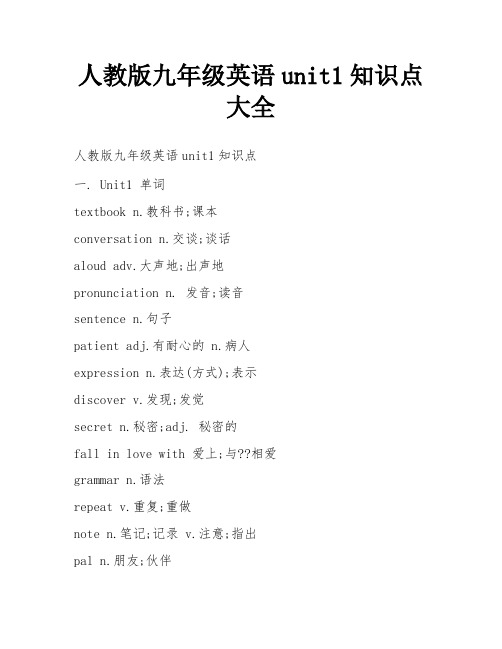
人教版九年级英语unit1知识点大全人教版九年级英语unit1知识点一. Unit1 单词textbook n.教科书;课本conversation n.交谈;谈话aloud adv.大声地;出声地pronunciation n. 发音;读音sentence n.句子patient adj.有耐心的 n.病人expression n.表达(方式);表示discover v.发现;发觉secret n.秘密;adj. 秘密的fall in love with 爱上;与??相爱grammar n.语法repeat v.重复;重做note n.笔记;记录 v.注意;指出pal n.朋友;伙伴pattern n.模式;方式physics n.物理;物理学chemistry n.化学partner n.搭档;同伴pronounce v.发音increase v.增加;增长speed n.速度 v.加速ability n.能力;才能brain n.大脑active adj.活跃的;积极的attention n.注意;关注pay attention to 注意;关注connect v.(使)连接;与??有联系connect…with... 把??和??连接或联系起来overnight adv.一夜之间;在夜间review v.& n.回顾;复习knowledge n.知识;学问wisely adv.明智地;聪明地Annie 安妮(女名)Alexander Graham Bell 格雷厄姆 ? 贝尔二.Unit1知识梳理Unit 1 How can we bee good learners?【重点短语】1. good learners 优秀的学习者2. work with friends 和朋友一起学习3. study for atest 备考4.have conversations with 与……交谈5.speaking skills 口语技巧6.a little 有点儿7.at first 起初起先8.the secret to... .......的秘诀9.because of 因为10.as well 也11.look up 查阅;抬头看12.so that 以便,为了13.the meaning of ……的意思14.make mistakes 犯错误15.talk to 交谈16.depend on 依靠依赖17.in mon 共有的18.pay attention to 注意关注19.connect …with …把……联系20.for example 例如21.think about 考虑22.even if 即使尽管纵容23.look for 寻找24.worry about 担心担忧25.make word cards 制作单词卡片26.ask the teacher for help 向老师求助27.read aloud 大声读28.spoken English 英语口语29.givea report 作报告30.word by word 一字一字地31. so……that 如此……以至于32.fall in love with 爱上33.something interesting 有趣的事情34.take notes 记笔记35.how often 多久一次36.a lot of 许多37.theability to do sth. 做某事的能力38.learning habits 学习习惯39.be interested in 对……感兴趣40.get bored 感到无聊【重点句型】1.提建议的句子:①What/ how about +doing sth.? 做…怎么样?如:What/ How about going shopping?②Why don't you + do sth.? 你为什么不做…?如:Why don't you go shopping?③Why not + do sth. ? 为什么不做…?如:Why not go shopping?④Let's + do sth. 让我们做…吧。
九年级英语知识点语法单元归纳
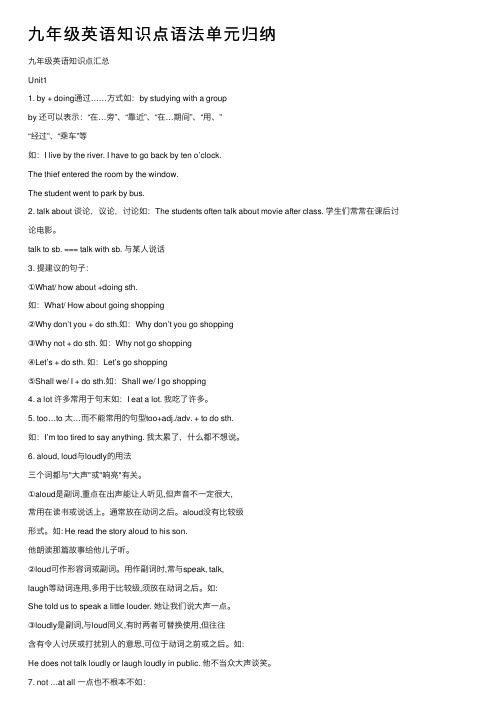
九年级英语知识点语法单元归纳九年级英语知识点汇总Unit11. by + doing通过……⽅式如:by studying with a groupby 还可以表⽰:“在…旁”、“靠近”、“在…期间”、“⽤、”“经过”、“乘车”等如:I live by the river. I have to go back by ten o’clock.The thief entered the room by the window.The student went to park by bus.2. talk about 谈论,议论,讨论如:The students often talk about movie after class. 学⽣们常常在课后讨论电影。
talk to sb. === talk with sb. 与某⼈说话3. 提建议的句⼦:①What/ how about +doing sth.如:What/ How about going shopping②Why don’t you + do sth.如:Why don’t you go shopping③Why not + do sth. 如:Why not go shopping④Let’s + do sth. 如:Let’s go shopping⑤Shall we/ I + do sth.如:Shall we/ I go shopping4. a lot 许多常⽤于句末如:I eat a lot. 我吃了许多。
5. too…to 太…⽽不能常⽤的句型too+adj./adv. + to do sth.如:I’m too tired to say anything. 我太累了,什么都不想说。
6. aloud, loud与loudly的⽤法三个词都与"⼤声"或"响亮"有关。
①aloud是副词,重点在出声能让⼈听见,但声⾳不⼀定很⼤,常⽤在读书或说话上。
九年级英语知识点归纳第一单元

第一单元是九年级英语中的重要知识点。
以下是对这一单元重点知识的归纳总结,包括语法、词汇和阅读技巧。
一、语法知识点:1.一般现在时:表示经常性或习惯性的动作、真理、固定安排等。
2.现在进行时:表示正在进行的动作。
3.一般过去时:表示过去一些时间发生或完成的动作。
4.现在完成时:表示过去的动作对现在产生的影响或结果。
5.一般将来时:表示将来要发生的动作或存在的状态。
6.祈使句:用于表示命令、请求、建议等。
7.陈述句、疑问句、否定句及其一般句型转换。
二、词汇知识点:1.名词:包括可数名词和不可数名词。
2.形容词:用来描述名词的特征、性质和状态。
3.副词:修饰动词、形容词或其他副词,表示时间、地点、程度等。
4.动词:包括不及物动词、及物动词、系动词和情态动词。
5.介词:用来表达位置、方向、时间等关系。
6.冠词:用于限定名词的用法,包括不定冠词和定冠词。
7.代词:用来替代名词的词语。
8.数词:表示数量的词语。
9.连词:连接词语、词组或句子,包括并列连词、从属连词和转折连词。
10.感叹词:表示情感、称赞或反问的词语。
三、阅读技巧知识点:1.标题理解:通过阅读标题和题目,抓住文章的中心思想和要点。
2.推理判断:根据文章中的信息,进行推理和判断。
3.词汇猜测:通过上下文理解词语的意思。
4.段落主题句:找到段落的主题句,了解段落的中心内容。
5.细节理解:找到文章中的关键信息和细节,加深对文章内容的理解。
6.推断推理:根据文章提供的信息,进行推断和推理。
7.时态和语态:了解文中所使用的时态和语态,以便更好地理解文章。
以上是对九年级英语第一单元的知识点进行的归纳总结,希望对你的学习有所帮助。
记得要不断复习和练习,加深对这些知识的理解和掌握。
九年级上册英语笔记第一单元

九年级上册英语笔记第一单元人教版九年级上册英语第一单元笔记。
一、重点单词。
1. textbook.- n. 教科书;课本。
- 例句:I left my textbook at school.(我把我的课本落在学校了。
)2. conversation.- n. 交谈;谈话。
- 短语:have a conversation with sb.(与某人进行交谈)- 例句:I had a great conversation with my teacher yesterday.(我昨天和我的老师进行了一次很棒的交谈。
)3. aloud.- adv. 大声地;出声地。
- 区别:aloud强调出声,能让人听见,但不一定是很大声;loudly则更强调声音大而喧闹。
- 例句:Please read the text aloud.(请大声朗读课文。
)4. pronunciation.- n. 发音;读音。
- 例句:His pronunciation is very good.(他的发音很好。
)5. sentence.- n. 句子。
- 例句:Make a sentence with this word.(用这个词造一个句子。
)6. patient.- adj. 有耐心的;n. 病人。
- 短语:be patient with sb.(对某人有耐心)- 例句:Our teacher is very patient with us.(我们的老师对我们很有耐心。
)7. secret.- n. 秘密;秘诀;adj. 秘密的;保密的。
- 短语:keep a secret(保守秘密)- 例句:It's a secret between us.(这是我们之间的秘密。
)8. look up.- (在词典、参考书中或通过电脑)查阅;抬头看。
- 例句:If you don't know this word, you can look it up in the dictionary.(如果你不知道这个词,你可以在字典里查阅它。
九年级英语第一单元知识点归纳总结

九年级英语第一单元知识点归纳总结一、重点词汇1、 textbook n 教科书;课本2、 conversation n 交谈;谈话3、 aloud adv 大声地;出声地4、 pronunciation n 发音;读音5、 sentence n 句子6、 patient adj 有耐心的 n 病人7、 expression n 表情;表示;表达方式8、 discover v 发现;发觉9、 secret n 秘密;秘诀 adj 秘密的;保密的10、 grammar n 语法11、 repeat v 重复;重做12、 note n 笔记;记录 v 注意;指出13、 pal n 朋友;伙伴14、 physics n 物理;物理学15、 chemistry n 化学二、重点短语1、 work with friends 和朋友一起学习2、 make word cards 制作单词卡片3、 read aloud 大声朗读4、 practice conversations with 与练习对话5、 improve speaking skills 提高口语技能6、 give a report 作报告7、 at first 起初;起先8、 word by word 逐词地9、 be patient 有耐心10、 the secret to 的秘诀11、 because of 因为12、 fall in love with 爱上13、 look up 查阅;抬头看14、 take notes 做笔记15、 keep a diary 写日记三、重点句型1、 How do you study for a test? 你是怎样为考试而学习的?2、 I study by working with a group 我通过小组合作来学习。
3、 It's too hard to understand spoken English 英语口语太难懂了。
九年级英语上册第一单元重要知识点总结

九年级英语上册第一单元重要知识点总结九年级英语上册第一单元重要知识点总结Unit 1一、知识点: 在旅馆的登记入住。
ut: 在旅馆结账离开。
2.By: ①通过…..方式(途径)。
例:I learn English by listening to tapes.②在…..旁边。
例:by the window/the door③乘坐交通工具例:by bus/car④在……之前,到……为止。
例:by October在10月前⑤被例:Englby many people.3.how与what的区别:how通常对方式或程度提问,意思有:怎么样如何,通常用来做状语、表语。
what通常对动作的发出者或接受者提问,意思为什么,通常做宾语,主语。
①How is your summer holiday? It’s OK.(how表示程度做表语)②How did you travel around the world? I travel by air.③What do you learn at school? I learn En glish, math and maubjects.① What……? How…like…?② What…do with…? How…deal with…?③ What…like about…? How…like…?④ What’s the weather like today? How’s the weather today?⑤ What to do? How to do it?e.g. What do youbook?=How do you lbook?I do n’t know what I should do watter.=I don’t know how I should deal w What do you like aboutChina?=How do you la?I don’t know what to do next step?=I don’t know how to do it next step?㊣What good / bad weaday!(weather为不可数名词,其前不能加 a )㊣What a fine / bad daday! (day为可数名词,其前要加 a )4. aloud, loud与loudly的用法: 三个词都与"大声"或"响亮"有关。
九年级上册英语第一单元知识点
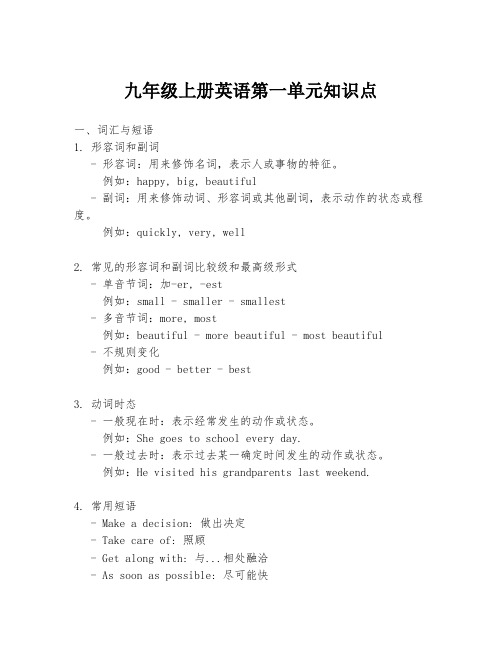
九年级上册英语第一单元知识点一、词汇与短语1. 形容词和副词- 形容词:用来修饰名词,表示人或事物的特征。
例如:happy, big, beautiful- 副词:用来修饰动词、形容词或其他副词,表示动作的状态或程度。
例如:quickly, very, well2. 常见的形容词和副词比较级和最高级形式- 单音节词:加-er, -est例如:small - smaller - smallest- 多音节词:more, most例如:beautiful - more beautiful - most beautiful- 不规则变化例如:good - better - best3. 动词时态- 一般现在时:表示经常发生的动作或状态。
例如:She goes to school every day.- 一般过去时:表示过去某一确定时间发生的动作或状态。
例如:He visited his grandparents last weekend.4. 常用短语- Make a decision: 做出决定- Take care of: 照顾- Get along with: 与...相处融洽- As soon as possible: 尽可能快二、语法点1. 比较级和最高级的构成- 规则变化:形容词和副词的比较级和最高级通常是通过在词尾加上-er和-est构成。
- 不规则变化:一些形容词和副词的比较级和最高级形式是不规则的,需要特别记忆。
- 双重比较级:使用more和less来构成比较级和最高级,适用于多音节和一些单音节形容词。
2. 比较级和最高级的用法- 比较级用于比较两者之间的差别。
例如:My sister is taller than me.- 最高级用于比较三者或三者以上的人或事物。
例如:Tom is the tallest student in our class.3. 时态的使用- 一般现在时通常用于描述习惯性动作或普遍真理。
九年级英语第一单元知识点总结
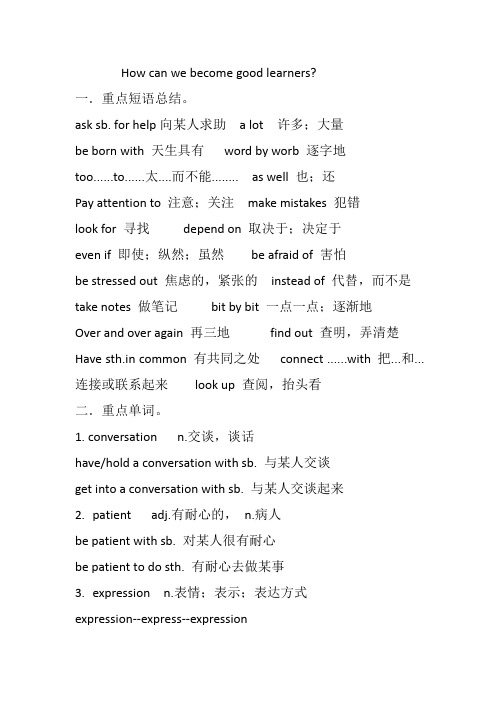
How can we become good learners?一.重点短语总结。
ask sb. for help向某人求助 a lot 许多;大量be born with 天生具有word by worb 逐字地too......to......太....而不能........ as well 也;还Pay attention to 注意;关注make mistakes 犯错look for 寻找depend on 取决于;决定于even if 即使;纵然;虽然be afraid of 害怕be stressed out 焦虑的,紧张的instead of 代替,而不是take notes 做笔记bit by bit 一点一点;逐渐地Over and over again 再三地find out 查明,弄清楚Have sth.in common 有共同之处connect ......with 把...和...连接或联系起来look up 查阅,抬头看二.重点单词。
1.conversation n.交谈,谈话have/hold a conversation with sb. 与某人交谈get into a conversation with sb. 与某人交谈起来2.patient adj.有耐心的,n.病人be patient with sb. 对某人很有耐心be patient to do sth. 有耐心去做某事3.expression n.表情;表示;表达方式expression--express--expressiondiscussion--discuss correct--correction4.discover V.发现,发觉discover与inventdiscover意为“发现”,多指发现目前客观存在的,却不为人之的事物;invent“发明”,之发明创造出原来没有的事物,尤其指科技上的发明创造。
九年级英语第一单元知识点完整版

1.名词和代词名词是用来表示人、事物、地点等具体概念的词语。
常见的名词有单数名词和复数名词。
代词是用来代替名词的词语。
常见的代词有人称代词(如I, you, he, she, it等)、物主代词(如my, your, his, her等)和指示代词(如this, that, these, those等)。
2.形容词和副词形容词用来描述或修饰名词,常位于名词之前。
副词用来描述或修饰动词、形容词、副词等其他词语,常位于被修饰词之后。
形容词和副词都有原级、比较级和最高级三种形式。
3.动词的时态和语态动词的时态有过去时、现在时和将来时等。
常见的动词时态有一般过去时、一般现在时、一般将来时等。
动词的语态有主动语态和被动语态两种形式,根据谓语动词的不同形式来表达主动或被动。
4.介词和介词短语介词是用来连接词与词之间关系的词语。
常见的介词有in, on, at, to等。
介词短语是由介词和紧跟其后的宾语构成的短语,用来修饰其他词语。
5.从句和句型从句是一个句子的一部分,可以作为名词、形容词或副词来使用。
从句包括主语从句、宾语从句、定语从句和状语从句等。
句型是根据句子结构和句子成分的不同形式而分类的。
6.数词和量词数词用来表示数量,包括基数词和序数词。
基数词用来表示具体的数量,如one, two, three等;序数词用来表示顺序,如first, second, third等。
量词用来表示物体或事物的数量和程度,如a few, a lot of, much, little等。
7.情态动词和情态动词的用法情态动词表示说话人的情感、请求、意愿等,如can, could, may, might, will, would, shall, should等。
情态动词后接动词原形,表示其中一种特定的意义和用法。
8.句子的疑问句和否定句疑问句用来提问,分为一般疑问句和特殊疑问句两种形式。
一般疑问句通常以助动词开头,主谓倒装。
否定句用来表示否定的意思,通常在动词前加not构成。
九年级英语 第一单元知识点总结
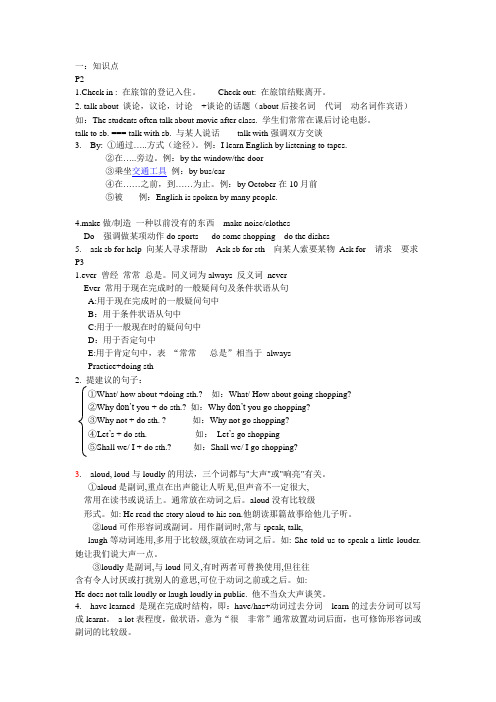
一:知识点P21.Check in : 在旅馆的登记入住。
Check out: 在旅馆结账离开。
2. talk about 谈论,议论,讨论+谈论的话题(about后接名词代词动名词作宾语)如:The students often talk about movie after class. 学生们常常在课后讨论电影。
talk to sb. === talk with sb. 与某人说话talk with强调双方交谈3. By: ①通过…..方式(途径)。
例:I learn English by listening to tapes.②在…..旁边。
例:by the window/the door③乘坐交通工具例:by bus/car④在……之前,到……为止。
例:by October在10月前⑤被例:English is spoken by many people.4.make做/制造一种以前没有的东西make noise/clothesDo 强调做某项动作do sports do some shopping do the dishes5. ask sb for help 向某人寻求帮助Ask sb for sth 向某人索要某物Ask for 请求要求P31.ever 曾经常常总是。
同义词为always 反义词neverEver 常用于现在完成时的一般疑问句及条件状语从句A:用于现在完成时的一般疑问句中B:用于条件状语从句中C:用于一般现在时的疑问句中D:用于否定句中E:用于肯定句中,表“常常总是”相当于alwaysPractice+doing sth2. 提建议的句子:①What/ how about +doing sth.? 如:What/ How about going shopping?②Why don’t you + do sth.? 如:Why don’t you go shopping?③Why not + do sth. ? 如:Why not go shopping?④Let’s + do sth. 如:Let’s go shopping⑤Shall we/ I + do sth.? 如:Shall we/ I go shopping?3. aloud, loud与loudly的用法,三个词都与"大声"或"响亮"有关。
- 1、下载文档前请自行甄别文档内容的完整性,平台不提供额外的编辑、内容补充、找答案等附加服务。
- 2、"仅部分预览"的文档,不可在线预览部分如存在完整性等问题,可反馈申请退款(可完整预览的文档不适用该条件!)。
- 3、如文档侵犯您的权益,请联系客服反馈,我们会尽快为您处理(人工客服工作时间:9:00-18:30)。
九年级英语第一单元知识点归纳1.break a world record 打破世界记录2.get a gold medal 获得金牌3.with a time of …用…时间4.at the same time 同时5.up and down 上上下下6.set a world record创造世界记录7.as fast as possible 尽快8.believe in sb 信任某人believe sb 相信某人的话9. make sb proud使某人感到自豪10. give up 放弃11.be able to do sth能够做某事be unable to do 不能做某事12. at the age of …在…岁的时候13.catch up with 赶上14. none of 一个也没有15.fall off 掉下16.do one’s best 尽某人的努力17.the others 别的九年级英语第二单元知识点归纳1.take turns 轮流, 交替2.hold a world record 保持世界记录3.be located in / on …位于4.be proud of 以…自豪5.on average 通常6.on record 记载下来有7.four times as --- as --- 是…四倍8.think of 想出9.find out 了解, 找出10.some more 更多一些11.try to do sth 试着去做某事12.all over the world 遍及全世界13.be full of 装满14.it’s + adj.+ for sb to do sth 对某人干某事怎么样15.it’s time for sb to do sth 某人该干某事了16.such as 例如17.take part in 参与18.that’s very kind of sb to do sth某人做事太好九年级英语第三单元知识点归纳1.pay …for…付钱, 赔偿2.make money 挣钱3.something to eat 吃的东西4. what’s the price of …价钱是…5. get up 起床6.be hard to do sth 做某事难e up to 到达8.go over to 走过9.give sth back to sb 把…还给某人10.do / deal with 处理11.elementary school 小学12.hold up 挂起13.on the Internet 在互联网上14.what else别的什么15.hear of 听说16.set up 创建17.have success in 在…取得成功business hours 营业时间18.any other 别的九年级英语第四单元知识点归纳1. wake up 醒来2. what’s wrong with …怎么了3. get a cold 感冒4. get dressed穿衣5. be weak in 在…薄弱6. point to 指向…7. ook up 查字典8. out of breath 上气不接下气9. miss school 没去上学10. take medicine吃药11. breathe through the nose通过鼻子呼吸的12. must be 一定表示推测否定:can’be13. stay healthy 保持健康14. be different from 不同于…15. be made from /of由…制成16. be bad for对..有害17. get a pain in …在…哪痛18. dare to do sth 敢于做某事19. think about 考虑20. get married结婚21. fall ill 生病22. as soon as 一…就23. the more, the better 越多越好九年级英语第五单元知识点归纳1. be famous for 以…而著名2. learn sth from 从…学到东西3. be born in+地点/ on +时间:出生于…4. not …until ….直到…才…5. make a mistake 犯错6. so…that …如此…以至7. so that 为了,以便8. come up with 想出, 提出9. in the 1960s 在二十世纪六十年代10. devote to do sth 致力于..11. because of 因为12. in one’s spare time 在空余时间13. it’s said that 据说14. nothing but 除了…什么也没有15. day after day 一天又一天16. in a difficult situation 在困难情况下17. talk about 谈论18. in the same year在同一年19. give first aid 进行急救20. make an example 举例21. in the Anti-Japanese War 在抗日战争中22. die of 死于…九年级英语第六单元知识点归纳1.have an accident 发生事故2.take care of 照顾3.warn sb ( not ) to do sth 提醒某人(不)干某事4. there ‘s something wrong with …有毛病5.stop sb from doing sth 阻止某人干某事6.instead of 代替7.long, long ago 很久以前8.be careful 小心9.it takes sb sometime/some money to do sth花某…时间/金钱干某事10.from then on 从那时起11.don’t have to do sth 没必要做某事12fall on the top of 掉在…上面13. on the edge of 在…边沿14.hurt oneself 伤到自己下册第一单元知识点归纳1.know / learn …by heart 记住…背诵…2.need to do sth 必须做某事3.look / sound / feel / like …看/听/感觉起来像…4.think of 想起…5.hear / see sb do / doing …听/看某人干某事6.start / end with….从…开始/以...结束7.express oneself 表达自己8.at the moment 此时9.a set number of 一定数量的10.either …or …或者…或者…11.both …and 两者都.12.fill in 填入13.look up 向上看. 查字典14.another two 另外两个15.different kinds of 各种不同类型的16.go ahead .向前走吧说吧干吧17.in the middle of 在…中间18.be related to 与…有关第二单元知识点归纳bine …and ...和…结合2.neither …or …既不…也不3.the answer to the question:问题的答案4.not only …but also…不仅…而且5.the same as…与…一样6.divide sth in half 把某物分成两半7.no longer不再8.had better ( not ) do sth 最好(别)干某事9.play chess 下棋10.say hello to sb 向某人问好11.what if 如果…将会怎样12.generally speaking 通常来说13.except for 除…外14.for example例如15.prefer…to 与…比较更喜欢…16.prefer to do sth rather than do sth 宁愿…而不愿…第三单元知识点归纳1.be different from 不同于…2.make a mistake 犯错3.pick up 拾起4.be full of 装满5.keep doing sth 保持干某事6.point to 指向…7.introduce …to …把…介绍给…8.eat up 吃光9.as soon as 一…就…10.talk about / with / to 交谈11.give sth back to sb 把某物还给…12.have trouble with 在…遇到麻烦13.face to face 面对面14.at the end of在…的最后15.in good Chinese tradition 按照中国的良好传统16.no problem 没问题17.never mind 别担心18.depend on 依靠视情况而定19.again and again 反复地20.praise …for …因…表扬…21.give sth back to sb 把…还给22.given name 名字23.family name 姓氏第四单元知识点归纳1.spend sometime/some money on sth:在某事上花费…时间/金钱2.have a fight with sb和某人争吵3.be bad for对…不利4.have / hold a meeting 开会5.be angry with sb/sth=be mad at sb/sth 生某人/某事的气6.agree to do sth 同意做某事agree with sb 同意某人意见7.either of 两个都8.belong to 属于9.the student council 学生会10.make a friend with sb 和某人交朋友11.understand each other 相互了解12.a number of 成员13.the Garden of Eden 伊甸园14.at last 最后15.have a talk 谈话16.and so on 等等17.to be honest 说实话18.the Garden of Eden 伊甸园第五单元知识点归纳1.how do you feel about …= what do you think of 对…感觉如何2.teach sb sth 教某人某事3.knock on /at the door敲门4.hang up 把…挂起5.it’time for …到…时候了6.help yourself to sth 请随便吃…7.turn on /off 打开/关闭8.hand in /out 上交/分发9.would you mind doing sth 介意我做某事吗10. it’s very kind of sb to do sth 某人做事真是太好了11.be / get ready for 准备做…12.get sth ready 准备好某物13.be different from 不同于…14.not …at all一点也不15.regard sth/sb as把某人/当作…16.from now on 从现在起17.three percent of 百分之三pare to /with 与…相比第六单元知识点归纳1.grow up 长大2.be free 有空,自由3.be busy doing 忙于做某事4.at first 首先5.graduate from毕业于6.up to 达到7.pay attention to 注意8.cut down 砍下9.encourage sb to do sth 鼓励某人做某事10.make progress 取得进步11.step by step 一步一步地12.be worth doing sth 值得做某事13.even if 即使. 纵然14.get a chance to do sth 有机会干某事15.as many as 230 million多达二亿三千万16.leave for 起程去…17.shout at 对…大声喊18.leave sb alone 让某人单独留下19.spend one’s vacation 度过某人的假期冀教版九年级英语上期末试题第I卷非选择题一、单项选择(共20小题,计20分)1.There is b “h”and “u”in the word “huge”.A.a;anB.an;aC.a;aD.an;an2.---Li Hua’s English is very good.---Yes,and her French her English.A.is as good asB.isn’t as good asC.is as well asD.is as better as3.---What’s wrong with you,Cheng Li?---I’m feeling .A.terribleB.terriblyC.badlyD.good4.---What did Lu Xun do after he gave up medicine?---He devoted writing all his life.A.him toB.himself inC.himself toD.her in5.---Why don’t you ask Tom to do it?---I don’t know whether he is to. He sometimes makes things worse.A.possibleB.afraidC.easyD.able6.---Did you go to Jane’s birthday party?---No,I .A.am not invitedB.wasn’t invitedC.haven’t been invitedD.didn’t invited7.“Tom, afraid of speaking in public. You are no longer a small boy.”said Mum.A.not beB.not to beC.be notD.don’t be8.---People can not only use salt for meals.---Yes. They also use it to fire.A.put onB.put offC.put outD.put down9.---Is it possible to be mad others?---Of course not.A.toB.atC.withD.for10.They found useful advertise on thee Internet.A.thatB.thisC.itD.it is11.---Why was the plane put off?--- the heavy rain?A.BecauseB.Because ofC.Instead ofD.After12.---Dad,when will you be free? You agreed to go to the seaside with me four days ago.---I’m sorry,Jack. But I think I will have a holiday soon.A.four-daysB.four-dayC.four daysD.four day13.---How long has this shop ?---For about three weeks.A.openedB.been openC.been openedD.open14.---I have won the girls’long jump.--- .A.It’s nothgingB.All rightC.Don’t be proudD.Congratulations.15.---Can you him studying hard?---No,I can’t. He never studies hard.A.stopB.preventC.keepD.warn16.---What about some soy milk? They are full of protein?--- .A.Yes,I’d love to.B.No,thanksC.I want to get vitaminD.It’s terrible17.--- is the price of the book?---It’s 188 yuan.A.How muchB.How manyC.HowD.What18.---We’d better g out for a walk instead of TV. Don’t you think so?---OK. Let’s go.A.to go;to watchB.going;watchingC.going;watchD.go;watching19.We don’t know . It is said that she would come tomorrow.A.how she will comeB.when she cameC.when she will comeD.when she comes20.Which of these signs is not seen in a supermarket?A.PushB.PullC.Business HoursD.Slow Down二、完形填空(10分)A boy who was cleaning shoes in the street said to a young man 21 by,“Let me clean your shoes, 22 ?”The young man said,“No,thank you.”“You may 23 me only a pound for that,sir.”said the boy. 24 the young man refused again.Then the boy told him that he would clean his shoes for 25 . The young man agreed to this,and soon one of his shoes was shining brightly. The man put 26 shoe on the boy,butthe boy refused to clean it unless he 27 two pounds for his work. The young man refused to pay anything and went away. But one looked 28 dirty that he couldn’t walk away. He had to 29 and gave the boy 30 . In a very short time his shoes shone brightly.21.A.passed B.passing C.pass D.passes22.A.will you B.do you C.don’t you D.can you23.A.spend B.cost C.take D.pay24.A.And B.Then C.But D.Or25.A.Anything B.Something C.Everything D.Nothing26.A.another B.otheres C.the others D.the other27.A.paid B.pays C.was paid D.pay28.A.such B.so C.very D.quite29.A.return back B.go away e back D.leave30.A.only one pound B.half a pound C.two pounds D.one and a half pounds三、阅读理解(30分)(A)Sports City BarEvery Tuesday and Thursday evening in Sports City Bar everyone can enjoy a “Buy one,get one free”Tex-Mex &seafood Buffet(自助餐) for 118 yuan.At our Sunday Family Buffet,we have exciting games for children. The buffet lasts from 11:00am to 2:00 pm. And costs 98 yuan per adult. Children aged 12 to 16 eat for half price,and children under 12(limited(限制) to two) eat for free.Happy hours at Sports City Bar lasts from 6:00 pm to 8:30 pm. But one soft drink,get one free. Tel:65118976-4228Location:The fourth floor,Blue Sky shopping centre.31.When can we enjoy the “Buy one,get one free”at Sports City Bar?A.On TuesdayB.On ThursdayC.On Sunday eveningD.On Tuesday and Thursday evening32.Who have free lunch at the Sunday Family Buffet?A.Children under 12B.All the childrenC.EveryoneD.Adults33.If you are thirteen,you .A. can’t buy one,get one free in Sports City Bar.B. Can eat for free at Sunday Family Buffet.C. Must pay 49 yuan for your lunch at Sunday Family BuffetD. Must go to the Sports City Bar with your parents34.The Sports City Bar is on the floor.A.firstB.secondC.thirdD.fourth35.How much will your father pay if he and your 10-year old brother go to have lunch at the Sunday Family Buffet?A.49 yuanB.98 yuanC.118 yuanD.147 yuan(B)Once Effendi had a joke with the Prime Minister(宰相). He said that the Minister would die the next day. The next day,the Minister fell to the ground from the horse and really died. When the king learned this,he got angry and sent his men to catch Effendi at once.When Effendi was brought to him,the king shouted angrily,”Effendi,since(既然)you knew when my Minister would die,you must know the date of your own death. Say it out,or you’ll die today.”Effendi looked at the king for a while. Then he answered,“But how can I know? I’ll die two days earlier than you.”The king was afraid that if he killed Effendi,he himself would die after that. He thought he must keep Effendi alive as long as possible,so he let Effendi go.36.This story tells us .A.how Effendi fooled the kingB.when the king would dieC.why the Minister diedD.Effendi knew the dates of everyone’s death37.The prime Minister died because .A.Effendi killed himB.Effendi said he would dieC.he was badly illD.he fell off the horse38.Why did the king ask Effendi to tell him the date of Effendi’s own death?A. Because the king wanted to know when he himself would die.B. Because he wanted to find an excuse to kill Effendi.C. Because he himself had known the date of Effendi’s deathD. Because he wanted to know when Effendi would die39.The king let Effendi go because .A.he hoped to live a long lifeB.he was afraid of EffendiC.he didn’t believe Effendi’s wordsD.he knew he would die two days later40.Which of the following is NOT true?A. Effendi played a joke on the Minister.B. The king was afraid of deathC. Effendi didn’t know when the king would dieD. If the king killed Effendi,he himself would die two days later( C)From the world’s heaviest apple,the oldest lady to the world’s smallest dog,these are all part of a group of the world’s strangest people and things. And they are all in the Guinness Book of Records(《吉尼斯记录》).The book is going to celebrate its birthday this August. It began exactly half a century ago. And it’s always one of the best selling books in the world.People now can break over 100 records every week! Why do so many people want to break the records? Do they want their names in the book or meet more people around the world?“It gives people a chance to show they’re the best in the world.”said one of the record keepers Stewart Newport.The book was started by Hugh Beaver from Britain. In 1951,he went shooting birds and talked with his friends about the fastest bird in Europe. Three years later,they were still talking about it. So Beaver believed that people must have different ideas. So,he decided to start a book to record the world’d truly greatest people and things in it!The newest book came out last Tuesday. This book has a lot of interesting records. Here are two:☆A British dog,Whitney,is the world’s smallest dog. It’s only 76mm tall.☆An American woman Lee Redmond has the longest fingernails(指甲).Theygrew as long as 600 mm! She made the record in 1971.41.We can see everything in the Guinness Book of Records except .A.the heaviest fruits and vegetablesB.the smallest people and animalsC.the strangest people and thingsD.very ordinary people and things42.The Guinness Book of Records has been one of the best selling books for .A.50 yearsB.76 yearsC.600 yearsD.1000 years43.Newport thought many people tried to break Gunness records because .A. their names be kept in the world records.B. their names could be seen by the whole world.C. they could meet more people all over the world.D. They could be known as the greatest by the world.44.Which of the following is right according to the passage?A. Newport started the Guinness Book of Records in Britain.B. More than four thousand records are broken each month.C. The Guinness Book of Records started in the year 1954.D. The newest book of Guinness comes out every Tuesday.45.The writer of this passage wants to 。
